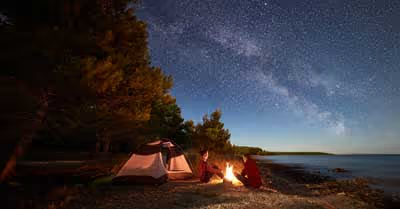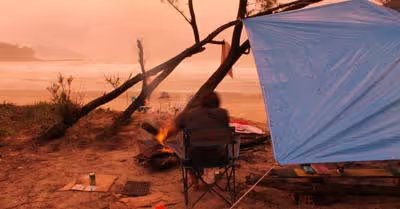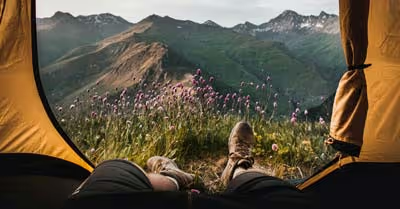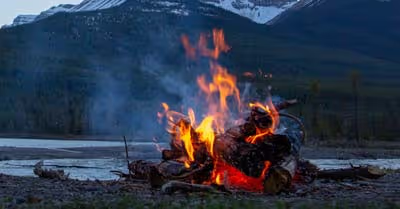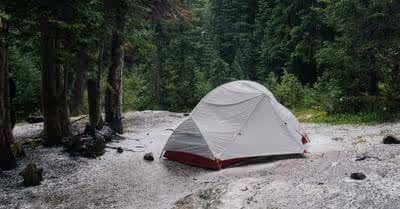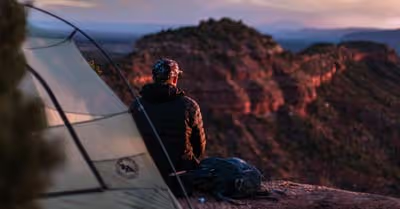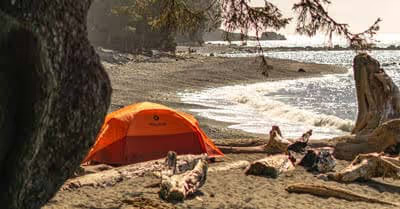Table of Contents
The most comfortable way to sleep in a tent
The trick to having a good camping trip is to make sure you bring what you need to make sleeping in a tent comfortable. Don't forget your earplugs, bug spray, sleeping pads, or anything else that will make your camping trip go smoothly.
Make sure the temperature is comfy
Nothing is more important than keeping your tent at a comfortable temperature. A campfire and a warm sleeping bag is the best way to keep your tent warm in cold weather.
If a campfire and a sleeping bag are not enough, you could bring a propane heater. You might also throw a tarp over your tent to trap the heat, avoid exposing your tent to the wind and use an insulated sleeping pad. Warm clothing is, of course, essential.
You are as likely to worry about getting too hot than getting too cold while camping. On a hot day with no wind, it can get way too hot inside your tent, and stay that way at night. Hot and humid air in your tent can keep you up or wake you up at night.
Sometimes, you might need a portable air conditioner, depending on how bad the heat and humidity is. Usually, a portable air conditioner is not necessary. Little things like pitching your tent in the shade, wearing light clothing, and buying a breathable tent well suited to hot weather can keep the temperature cool enough.
Another useful trick is to make sure that the wind can pass through your tent. If the wind is unable to blow on your tent, it will be unable to cool it. Having a lot of people sleeping in one tent can prevent it from cooling off at night as well.
One last trick for keeping your tent cool at night is to use a reflective blanket. A reflective blanket is like a tarp that you put over your tent, which reflects light away from your tent and prevents the sun from heating it.
Don't eat or drink much in the last few hours before bed
Not eating much in the last few hours before bed can help you get to sleep at home, and can help you sleep better in the woods as well. If you eat a lot of food in the last few hours before going to sleep, it will reduce your sleep quality, and you will wake up in the middle of the night.
Don't drink a lot of water during the last few hours before bed either, or else you will have to get up at night and might not be able to get back to sleep again. Drinking caffeine even six hours before bed might keep you up or give you low quality sleep. Things that can keep you awake at home can keep you awake while camping as well.
Don't sleep in your clothes either. The clothes you wear to bed should be different from the clothes you wear during the day if you want quality sleep. Don't rely on clothing to keep you warm at night; find another way to keep yourself warm in your sleeping bag.
Get a high-quality sleeping bag
Get a high-quality but not necessarily expensive sleeping bag that is well suited to the season. A summer sleeping bag is not warm enough for the winter. Some sleeping bags advertise themselves as being for all seasons, but I prefer sleeping bags that are season specific.
Don't forget the bug spray
Bugs can ruin an otherwise great camping trip. Make sure to bring enough bug spray for everyone. If you hate the smell of typical bug spray, there are better-smelling alternatives.
Bug repelling clothes are another option. If you don't mind wearing it, bug-repelling clothing is cheap and does work. You can also get bug-repellent bracelets, which gradually let a small amount of bug-repelling chemicals into the air around you.
Another way to beat the bugs is to zip the tent shut right away every time you enter or leave it. If you can remember to do this, insects won't have much of a chance to keep you up at night. There are plenty of other products, such as insect repellent coils, essential oils, and diffusers, that can prevent bugs from keeping you up at night.
Set up the tent properly
You won't be able to get a comfortable night's sleep unless you are careful about setting up the tent in an excellent spot. Don't rush when you set up the tent - take your time; camping is about getting away from the rush of ordinary life. Pitching your tent in the right spot is more important than getting your tent set up quickly.
Be very careful to pitch your tent on the best spot you can find. The ground should be flat, free of rocks and other objects, and comfortable to lie on. Be picky about where you place the tent; find a truly good spot before you set your tent up.
You don't want snow falling down on your tent, so keep it away from trees in the winter. During the summer, you might want to keep it closer to trees so that your tent can be in the shade. Place your tent on grassy ground, as the grass is comfortable to lie on.
Bring some earplugs as well
Everyone knows that the outdoors is not silent, and the lack of quiet can keep you up at night. Being away from your usual surroundings can either help you sleep better or make it harder to sleep comfortably.
Bring earplugs to shut the noise out, and you will get excellent sleep while camping. Make sure that your earplugs fit your ears properly, or else they will hurt your ears.
Bring a pillow with you
You might feel tempted not to bring a pillow as it will save room in your vehicle. If you sleep without a pillow at night, especially in a tent, you may wake up with a sore neck in the morning. To save your neck, get an inflatable camping pillow that weighs very little and takes up very little space.
Many companies make pillows that are for the outdoors and designed to take up as little space as possible. Inflatable pillows weigh the least; you could also try compressible pillows. Compressible pillows are more comfortable than inflatable pillows but do not weigh quite as little.
Sleeping pads
Sleeping pads are another product that can make the difference between a good camping trip and a bad one. Sleeping pads can protect you from any bumps in the ground or small rocks that are under your tent.
You have to choose between more comfortable but heavier sleeping pads and lighter but less effective ones, just as is the case for camping pillows. Foam pads are the lightest and take up the least space; self-inflating pads are not as lightweight.
If you need to travel as light as possible, go with foam pads. Otherwise, the inflatable and self-inflating pads are more comfortable and more popular choices.
Try to sleep on your back, because sleeping on your side makes the sleeping pad less effective. You can feel the ground if you sleep on your side.
Relax and adjust to your surroundings
You might have trouble sleeping properly on your first night because you are doing something out of the ordinary, which can keep your mind from shutting down. If you are doing something unusual, your brain may become very alert, and you may wake up at the slightest sound.
After the first day, you should find it easy to get to sleep earlier than usual, but if not, you should have a book and a light with you to help you fall asleep. You should start feeling tired as soon as the sun goes down after a day or two because you are away from normal modern life and will start getting tired at a natural time.
Going to bed earlier than usual is also a good idea because you will wake up very early, whether you stayed up late or not. Staring at a sky full of stars before bed can also help you relax and have a comfortable, uninterrupted night's sleep.
Don't let water get inside your tent
If the inside of your tent gets wet, you are going to have trouble sleeping well. Make sure that you change into dry clothes before you go to bed.
Keep your night clothes and day clothes separate - have some clean and dry clothes that you only wear at night.
As well as keeping water out, you want to keep dirt out as well. Anything that makes your tent less comfortable can interfere with your sleep. Wear clean clothes when inside the tent and always remember to take off your shoes before you enter it.
Protect your tent from the rain
With the summer months come rainstorms, and a rainstorm can get the inside of your tent wet if you do not protect it. A tarp can be a lifesaver here. One of the first things that can ruin your comfortable sleep is having the inside of your tent get wet, so always bring tarps.
If you put a ground tarp underneath your tent or on the ground inside it, you can keep the water out. You can also throw a tarp over your tent to block rain that would otherwise get into your tent through the seams.
Bring newspaper to soak up water
If you have enough room, you should take some newspapers with you. If a small amount of water gets into your tent, newspapers can help you get it dry again.
Make sure there is enough room in your tent
No one wants to sleep in a tent that is too crowded. Bring a big enough tent or more than one tent if there are enough of you. No one will sleep well if you have too many people and too many people's belongings in a tent that isn't big enough.
If you camp in the winter, buy a four-season tent
Camping in the winter is not for everyone, but it can be a daring and adventurous thing to do. There's just as much to do outdoors in the winter as in the summer. Winter camping can be a lot of fun as long as you stay warm.
As well as making particularly sure to bring the right clothing and the right gear, you need a tent that is good enough for the winter. Three season tents are for the spring, summer, and fall, four-season tents are for the winter as well.
Four season tents retain the warmth better and are more resistant to the wind, which is particularly important in the cold winter months. Four season tents have stronger tent poles and heavier cloth.
Have as much fun as possible
The more fun you have during the day, the better you will sleep at night. If you spend the day swimming, canoeing, hiking, fishing, exploring, and using up energy, then getting a great night's sleep should be easy as long as you keep your tent reasonably comfortable. The sun and the break from the ordinary should help you sleep better than you do at home.
Recent Articles



